Call Me Madam (1953) Online
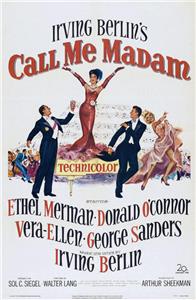
Boisterous, fun-loving, and popular Washington D.C. hostess Sally Adams is appointed U.S. Ambassador to the Grand Duchy of Lichtenburg, Europe's smallest country. In Lichtenburg, the Duke and Duchess are negotiating a political marriage for their niece, Princess Maria in exchange for a substantial dowry. However, the country is desperate for funds, and turns to the inexperienced ambassador for a much needed U.S. loan. Sally refuses to talk money, that is, until she meets the ultra charming Gen. Cosmo Constantine. Meanwhile, Sally's press attaché Kenneth Gibson falls head over heels for Princess Maria.
| Complete credited cast: | |||
| Ethel Merman | - | Sally Adams | |
| Donald O'Connor | - | Kenneth Gibson | |
| Vera-Ellen | - | Princess Maria | |
| George Sanders | - | General Cosmo Constantine | |
| Billy De Wolfe | - | Pemberton Maxwell | |
| Helmut Dantine | - | Prince Hugo | |
| Walter Slezak | - | August Tantinnin | |
| Steven Geray | - | Prime Minister Sebastian | |
| Ludwig Stössel | - | Grand Duke Otto (as Ludwig Stossel) | |
| Lilia Skala | - | Grand Duchess Sophie | |
| Charles Dingle | - | Sen. Brockway | |
| Emory Parnell | - | Sen. Charlie Gallagher | |
| Percy Helton | - | Sen. Wilkins |
While Donald O'Connor was hesitant to select a favorite film, he was quick to single out his favorite performance: "Madame macht Geschichte(n) (1953) - my favorite number is in there with Vera-Ellen. It's the number I do out in the garden with her to "It's a Lovely Day Today". It's a beautiful lyrical number. I think she was the best dancer outside of Peggy Ryan I ever danced with".
Due to the expiration of 20th Century Fox's music rights, the movie was completely withdrawn from public exhibition (both TV and theatrical) for nearly 20 years. During that time, its only public showing (with special permission from Irving Berlin) was at a 100 year tribute at the Los Angeles County Museum of Art in the 1990s. After the rights were renewed, the film was finally released on DVD in April 2004.
In all but one scene in this movie Vera-Ellen's neck is covered. She suffered from anorexia and her neck and throat were thin and wrinkled.
This is the only full film musical that George Sanders made, despite his appealing singing voice.
Before pre-recording the song "You're Just in Love", Donald O'Connor felt that a better result would be achieved if he sang it with Ethel Merman in a recording studio accompanied by the orchestra. Musical Director Alfred Newman agreed and let them sing together. It turned out that Merman's legendary loud singing voice was too deafening for O'Connor. In the end, they had to record the song with O'Connor in an isolation booth. When filming the musical number accompanied by the pre-recorded playback, O'Connor had to wear ear plugs.
The pairing of Donald O'Connor and Vera-Ellen was very well received, due to their complementary dancing styles and personalities. However, attempts to re-team them were unsuccessful, most notably with Weiße Weihnachten (1954), in which Danny Kaye replaced O'Connor at the last minute due to his sudden and severe illness. Coincidentally, Danny Kaye is mentioned in "Call Me Madam" as a joke.
Ethel Merman recreated the role that she had originated in the Broadway production which opened at the Imperial Theatre on October 12, 1950 and ran for 644 performances through May 3, 1952.
Dinah Shore had to sing Ethel Merman's songs on the original cast album for the Broadway play because Merman, who had starred in the original stage production, was under contract to Decca Records, who wouldn't release her to do the album.
Although Lichtenburg is a fictional country, the character of Sally Adams is based on the real-life Perle Mesta, a Washington, D.C. social hostess who in 1949 was named Ambassador to Luxembourg by President Harry S. Truman. The program of the Broadway show included the disclaimer: "Neither the character of Mrs. Sally Adams nor Miss Ethel Merman resemble any person living or dead."
One of the few major musical films of the 1950's which was never shown on one of the 'Big Three' networks, ABC, NBC, or CBS. It was, instead, sold directly to local stations, as most films used to be prior to 1956.
Ethel Merman's on-screen rendition of "The Hostess With the Mostes' on the Ball" was shorter than her Broadway version, which had included an encore, and a stage quip warning an ambassador's date "not to leave her panties in the hall" was scrubbed from the picture's lyrics.
Two Irving Berlin musical satires of Washington D.C. politics were not transferred from Broadway to Hollywood: the Ethel Merman-centered "Washington Square Dance" (although in the movie a few bars are sung by an off-screen chorus, and the melody is played during a party scene); plus a trio of senators (who on Broadway were Pat Harrington Sr., Ralph W. Chambers and Jay Velie) intoning "They Like Ike" (which inspired the memorable catch phrase of the 1952 Eisenhower presidential campaign).
The stage production of "Call Me Madam" opened at the Imperial Theater in New York on October 12, 1950 starring Ethel Merman and ran for 644 performances.
For the 1950-51 Broadway season, Ethel Merman's performance in "Call Me Madam" won the Tony Award for Leading Actress in a Musical.
What had been an Ethel Merman number on Broadway, "Something to Dance About" was filmed with Donald O'Connor and Vera-Ellen (dubbed by Carol Richards) singing and dancing in a secret passageway. Along with George Sanders, the aforementioned all reprised a bit of this tune in the final medley, which also included "You're Just in Love."
The movie contains two vintage Irving Berlin songs written before his 1950 Broadway score. "The International Rag" (as Ethel Merman sings it, although the official title is "That International Rag") had been introduced by Mr. Berlin himself at the London Hippodrome in 1913. Sophie Tucker made the ditty famous via her vaudeville act. In the picture, just prior to delivering this number at the presentation ball, Ethel jokes with the orchestra leader (played by Leon Belasco) about this "hot" new tune from 40 years earlier. Donald O'Connor's song-and-dance-solo, which had him tearing up a tavern -- "What Chance Have I With Love?" -- was first performed by Victor Moore in Irving Berlin's 1940 Broadway musical, "Louisiana Purchase." Although Mr. Moore would appear in Paramount's 1941 screen adaptation, his lament to love would not carry over to this film score.
While Alfred Newman took home the Oscar for Scoring of a Musical Picture, he had failed to garner a nomination that same year in the dramatic category for Das Gewand (1953), a score considered by film-music scholars to be one of Mr. Newman's finest compositions.
Instead of loaning out Ethel Merman to RCA Victor for the original-cast album of "Call Me Madam" (Dinah Shore replaced her), Decca made their own album with Merman, Dick Haymes and Eileen Wilson. On it, Merman sings the song "Washington Square Dance," which is heard in the movie only as background music in the opening party scene in Washington, D.C.
A lesser-known 'Irving Berlin (I)' ballad from his 1950 stage score went missing from the film: "Once Upon a Time Today," written for the Kenneth Gibson character and performed on Broadway by Russell Nype.
A running gag in the movie has Sally Adams taking calls from President Harry Truman, and receiving bad news about his daughter Margaret's singing career. ("Even in Denver? Well, the opera critics don't know everything. She made money, didn't she?") During her father's administration, Margaret Truman went on tour as an opera singer. Her performances always attracted large crowds, but opera critics often panned her singing. After one particularly harsh review, Harry Truman sent a personal letter to the critic: "Some day I hope to meet you. When that happens you'll need a new nose, a lot of beefsteak for black eyes, and perhaps a supporter below!"
Ethel Merman won the 1951 Tony Award for best actress in a musical and she won the 1954 Golden Globe Award for this film version.
Ethel Merman as Sally Adams and Lilia Skala as Grand Duchess Sophie reprised their roles from the original Broadway production.
In the scene towards the end. When the three telephonists salute the one on the right gives a British Army one, palm vertical facing out. She is played by Lois Maxwell of Miss Moneypenny fame.
The year after this movie was released, Ethel Merman and Donald O'Connor again appeared together, this time playing a mother and son, in Rhythmus im Blut (1954), also directed by Walter Lang and featuring a musical score by Irving Berlin.
Lois Maxwell: One of the singing switchboard-girls. She is best known as Miss Moneypenny in many of the James Bond films..

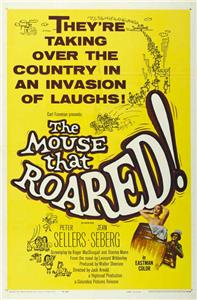
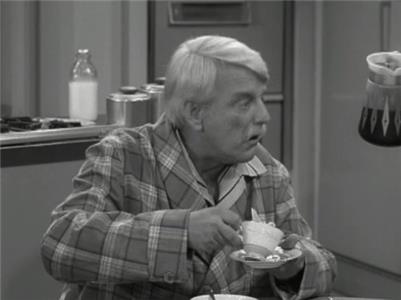
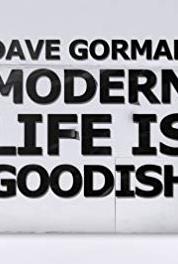
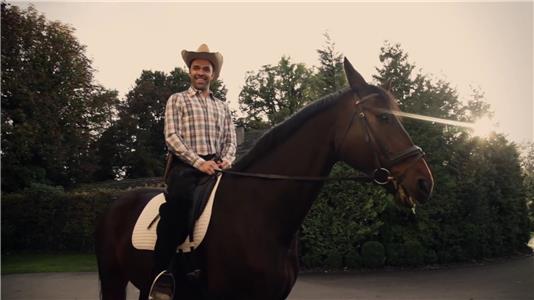
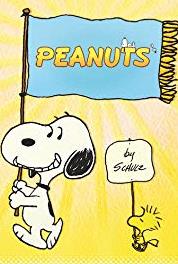

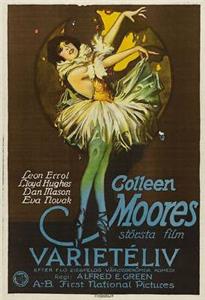
User reviews